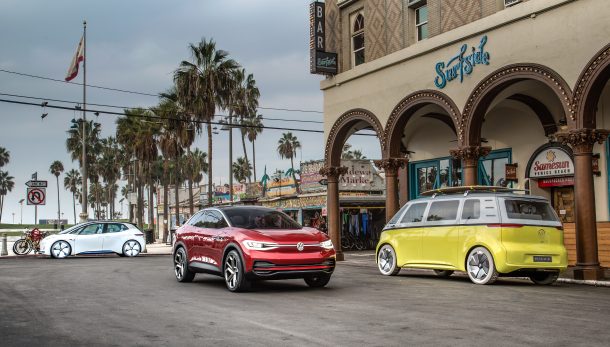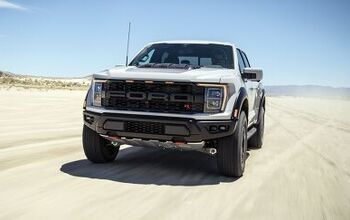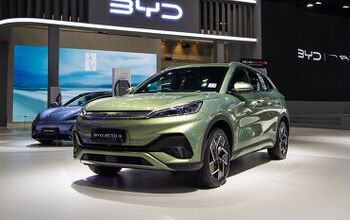Volkswagen's Not Ruling Out an Electric Tie-up With Ford

Pretty much everything is on the table at this point. At least, that’s the way it looks to industry observers. The partnership announced between Ford and Volkswagen back in June has the potential to birth any number of outcomes — from jointly developed commercial vehicles (the initial aim), to badge-swapped overseas small cars, autonomous vehicle hardware, and perhaps even borrowed electric vehicle architecture.
As it prepares the launch of its MEB-platform electric vehicles, Volkswagen’s not saying “no” to letting Ford have a piece of the action.
Of course, it’s not saying “yes” either. Speaking on a conference call Tuesday, Volkswagen chief financial officer Frank Whitter said the company is open to new hookups, Automotive News reports, but wouldn’t say whether or not its MEB architecture would ever be up for grabs.
“Whether we might provide access to other brands outside of the VW Group is theoretically possible, but there is no decision,” Whitter said.
Having access to VW’s EV architecture would be a cost-saving boon for Ford, which begins its electric product push with the release of a sporty crossover in 2020. At this year’s Detroit auto show, Ford announced plans to release 40 electrified models by 2022, 16 of which would be fully electric. To do this, the automaker will spend $11 billion.
VW’s first MEB vehicle, a compact hatchback, starts production in November 2019. Following that, a crossover and reborn Microbus appear, with production eventually leaving Germany for the U.S. and China. Those latter two models likely have a home in Tennessee.
All told, VW aims to build 10 million electric vehicles using its new architecture. One of the brand’s main areas of focus is the Chinese EV market — a cash-rich cornucopia of state-incentivized green vehicle buyers. It’s a market Ford, which saw its Chinese operations hit a towering roadblock in recent months, would definitely like a larger slice of.
Platforms aside, Whitter said VW is eagerly looking to lower future costs by partnering with big players in the autonomous driving field.
“It’s no secret that this is very expensive to develop and that there is the one or the other that is far ahead, such as Waymo in the U.S., so we are naturally thinking about how we can narrow the lead. Or if this isn’t feasible, how we can strengthen our own activities,” Whitter said. “There’s no final decision.”
[Image: Volkswagen]

More by Steph Willems
Latest Car Reviews
Read moreLatest Product Reviews
Read moreRecent Comments
- Arthur Dailey 'The capitalists will sell use the very rope that we use to hang them.' In our household we have cut down our shopping/spending and pay more to purchase products from 1st world nations or 2nd world nations that are our 'allies'. That also means quite often only buying and eating fruit and vegetables that are in season. Just like our parents and grandparents did.At least TTAC published an article on May 21st regarding LAN transformers that contravene the Uyghur Forced Labour Prevention Act being used in some BMW, Jaguar, Land Rover, and VW products?
- ToolGuy I wouldn't buy any old Chinese brand of vehicle, but the right EV at the right price, maybe possibly yes. If you told me this would alarm Ford and torque off FreedMike, all the better. 😉P.S. I would *definitely* consider an EV made in Taiwan. Take that, paramount leader!P.P.S. China batteries/components to convert one of my ICE vehicles to EV? Yes.
- Wolfwagen I expect Renault to be less popular than Fiat
- ToolGuy Helium-3, baby!
- Roman Our 1999 Pontiac Sunfire Gt is still running without any issues. 25 years and counting.


































Comments
Join the conversation
"Electric tie-up"? And I thought Bertel Schmitt had moved on.
The Tesla Effect: An Elon Musk Adventure